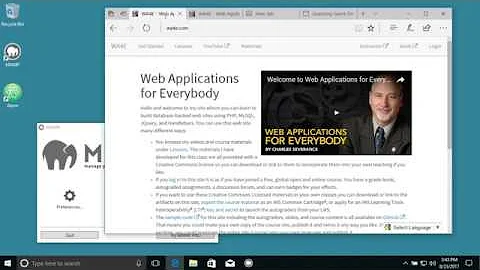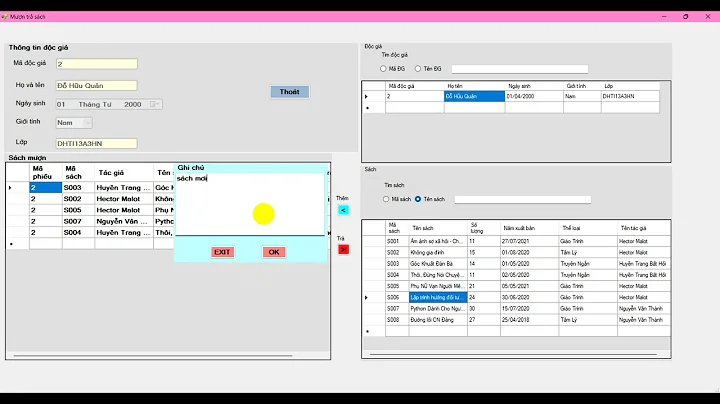Something compareable to 'localtunnel' for Windows
Solution 1
PageKite (disclaimer: I made this!) solves the same problems as localtunnel, but it is completely self-contained (written in Python, does not rely on ssh) which makes it very easy to install on Windows. Admittedly, you still have to deal with the command-line or at least edit the config file by hand, but a more user-friendly Windows GUI is in the works.
PageKite is free software (both the client and server) for those who want to DIY, but it's also backed by a start-up which provides all the service you need to get up and running in minutes.
Solution 2
localtunnel for windows
Expose instantly your local webserver to the internet! See main project for more info...
UI Features
- Custom service host setting
- Win7 Jumplists for quick tunneling
- Public key autogeneration
- Specify a different host address than 127.0.0.1...
Solution 3
Just install ruby, then run the same commands. I just did that and works on Win7 x64.
-
Create an ssh key (make sure you don't already have one and will overwrite, for GitHub, etc).
ssh-keygen -t rsa -C "[email protected]"
-
Then upload your key to localtunnel (I had to enter my passkey setup in step above)
localtunnel -k c:/Users//.ssh/id_rsa.pub [server port]
Solution 4
I wrote up a description of how to get localtunnel up and running on windows via CygWin.
http://blog.wearemammoth.com/2011/09/localtunnel-windows.html
-m
edit: apparently this link is broken - here's the cached version http://webcache.googleusercontent.com/search?q=cache:lcJq2KO-ODoJ:blog.wearemammoth.com/2011/09/localtunnel-windows.html+&cd=1&hl=en&ct=clnk&gl=us
and here's the content in case that disappears too:
We recently integrated with the awesome Twilio service for a small project we developed. Like many of today’s APIs, Twilio offers a number of webhooks that alert you to changes on the Twilio side. This simple but great concept really opens up a lot of possibilities for API users everywhere, and I’m glad to see it spreading. Unfortunately, webhooks by their very nature require that you have a publicly accessible URI for the service to callback to, which makes developing your webhook handler a little bit difficult when you’re working locally. Enter localtunnel, a nifty little tool that makes localhost visible to the rest of the world and lets you build and debug your webhooks on your development environment without having to worry about publishing your changes every few minutes to a public site.
Unfortunately, if you’re developing on Windows, localtunnel won’t work quite as easily out of the box as it would for Mac and *nix users.
Here at WAM, we mainly develop on Microsoft’s .NET platform, which acted as a barrier to our ability to use localtunnel. Since the tool was attractive enough to warrant spending a little time setting it up on my Windows environment, however, I dug in my heels and figured out the general steps needed to get it working.
Rather than go through the number of misguided steps I followed due to my own unfamiliarity with the tools localhost relies on, I’ll cut to the chase and explain what I eventually set up to get everything working together.
First, install Cygwin. During installation, make sure you opt to install dev tools – you’ll definitely need at least Make, gcc, SSH and Ruby. Download and unzip RubyGems into a folder that you can access under Cygwin. Install RubyGems by changing to that temporary directory on your Cygwin bash prompt and running: ruby setup.rb Install localtunnel by running: gem install localtunnel Generate a public/private key by running. ssh-keygen When it prompts you for a file to save, enter nothing and press enter. It will put the file into your home folder. ‘~/.ssh’ and the path to the file is ‘~/.ssh/id_rsa.pub’ by default.
Make note of where your public key is saved. Run localtunnel for the first time by running localtunnel -k {Path_To_Your_Public_Key} {PORT_NUMBER} For example
localtunnel -k ~/..sh/id_rsa.pub 8080 This will upload your public key to localtunnel and respond with something like
This localtunnel service is brought to you by Twilio. Port 8080 is now publicly accessible from http://3ivy.localtunnel.com ... From then on, you can just run localtunnel 8080 And get a temporary public URL for your local app.
One thing to note is that I had to use a port like 8080 to get it to work – something like 49581 wasn’t working and rather than fiddle with it anymore, I just set up vs.net to always build my local project to port 8080.
As always, your mileage may vary and this comes with the standard warning that this worked for me, but may not for you.
Good luck!
Solution 5
Somebody is working on a Java version of the localtunnel client, so stay tuned! Otherwise, no, I don't think other than setting up your own SSH tunnel there is a Windows alternative.
Related videos on Youtube
woezelmann
Updated on October 05, 2020Comments
-
 woezelmann over 3 years
woezelmann over 3 yearsI found this here http://github.com/progrium/localtunnel , and it's exactly what I need, but I am working on Windows and localtunnel is Unix...
Some backgorund: I am currently developing a Facebook app and the Single-Sign-On won't work on my local Tomcat.
-
christoff almost 13 yearsis this project on github somewhere? would be interested in contributing
-
Guillaume86 over 11 yearsThis blog post helped me when I tried to use localtunnel with IISExpress: irwinj.blogspot.be/2012/06/…
-
 Smith almost 11 yearsi tried pagekite yesterday, and it worked like charm. i was allocated 2GB bandwidht for 30 days
Smith almost 11 yearsi tried pagekite yesterday, and it worked like charm. i was allocated 2GB bandwidht for 30 days -
Jonno over 10 yearsthis tool solves a very different problem..
-
Jonno over 10 years+1 for us localtunnel was a timewaster, this just worked
-
Peter Moberg almost 10 years+1 PageKit just works!

![Fix: [.ShellClassInfo] Windows 7|8|10 (Desktop.ini) | Songkhangluu✅](https://i.ytimg.com/vi/VwUX9_yIw_8/hqdefault.jpg?sqp=-oaymwEcCOADEI4CSFXyq4qpAw4IARUAAIhCGAFwAcABBg==&rs=AOn4CLCBnwJ8f8_3NrvMUI81ErWXeHPwFg)




![Easily expose your localhost services to the Internet [Hindi]](https://i.ytimg.com/vi/KjAbdyTH9fE/hq720.jpg?sqp=-oaymwEcCNAFEJQDSFXyq4qpAw4IARUAAIhCGAFwAcABBg==&rs=AOn4CLDcLgI_ivMyJgZFBdx2jdDdPoyhdA)









